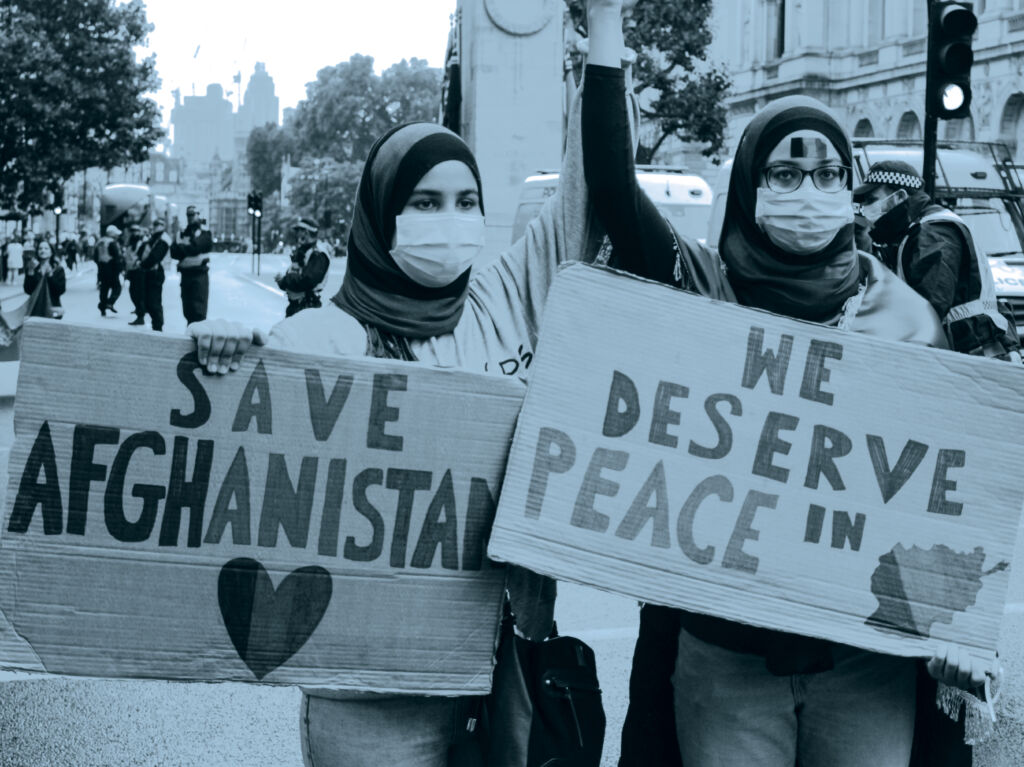Two decades is a long time to endure the impacts of anti-terrorism legislation and their sanctioned actions. It was long enough for me to grow up, from a scared 5th grader on the morning of 9/11 to a young Muslim woman who left an America, ravaged by its aftermath, for Canada.
It was even long enough for me to see that, although we immigrated to Canada wide-eyed and hopeful, anti-terrorism legislation here and the Islamophobia that it allowed to take hold, didn’t discriminate between criminals and creative writing students. Now living in Karachi, Pakistan with three children of my own, we are firmly outside of this bubble, peering in at the policies and places that I once called home.
This past fall, imagery of Afghani residents clinging to airborne planes haunted the global conscience. And understandably so. The striking exodus was chaotic and dystopian. Unprecedented. But when you live in this part of the world, those horrific pictures are a small stretch from the lengths someone you know might go to to get out. The descent into harsh reality can also feel just as sudden and catastrophic. A free fall.
Much has been said about the impact that “routine surveillance” and “social sorting” has had on Muslim immigrants once they’re in Canada, but I maintain the undoing starts much closer to home. The process of immigrating is, itself, incredibly stressful and difficult to navigate. While Canada’s federal government has a site to help immigrants verify the legitimacy of their immigration representatives, there are loopholes and susceptible areas that uncouth immigration “agents” prey on, such as by saying that while they might not be listed, they are authorized representatives of a lawyer that is. This practice is made more complicated by the captivating, yet unfounded, beliefs reverberating widely among the developing nations’ consciousness. Rose-tinted information shared by relatives abroad, combined with unregulated legal representation in the home country and compelling alibis on behalf of agents create the necessary conditions for a perfect storm.
What happens when immigration processes are mired by misinformation on social media and capitalized on by promises sold with slick marketing tactics against a backdrop of insidious psychological warfare?
Collectively, it spawns a similar, albeit less visible, form of desperation.
A stage set for disappointment
Tuba Tanveer, a Muslim influencer with a substantial YouTube following (billion_hobbies), migrated to Canada from Pakistan in 2020 and is currently based in Calgary.
“When it comes to immigration, I believe the basic thought behind it is building a better life for oneself and paving the way for a better future,” she says. And it’s this ‘trade-off’, abandoning what is, at times, a life of comfort in the homeland for next-generation dividends like equitable health care, education, safe workplaces and comprehensive social security that constitutes the lure of the immigration siren.
Coupled with political instability, systems riddled with corruption, costly private education—and often, turmoil or extremism—in their home nation, for many, the temptation becomes too great and the stakes too high not to take the plunge.
The greener pasture expectations of immigration, instead of being pragmatically managed by immigration consultants, are shamelessly capitalized.
It’s a psychological phenomenon, says Tanveer: “people think if they change their environment, everything in their life will magically change… What people need to understand is leaving their country will not end their hardships and struggles. It will just change the nature of them.”
This misunderstanding is fuelled, in part, by the stories of loved ones abroad. Many expats may paint more positive portraits of their lives than they actually experience, putting up a compelling façade and hiding, for example, their underemployment hardships or the reality of poverty in ethnic enclaves in Toronto in order to alleviate stress or avoid bringing shame upon their families.This behaviour contributes to sprawling gossamers of glittering promises and lies about the reality Muslim immigrants face in Canada.
It’s a lose-lose situation, explained Murtaza Haider, a professor of Real Estate Management at Ryerson University and a Director of Regionomics Inc. While he rooted his searing commentary on Pakistani migrants specifically, it is equally representative of many Muslims from developing nations: “Pakistan-born immigrants [have become] the face of Canada’s urban poverty. Their dismal performance in Canada and the spread of religious fanaticism back home will most likely further reduce immigration from Pakistan,” he wrote.
Adding fuel to the fire
The greener pasture expectations of immigration, instead of being pragmatically managed by immigration consultants, are shamelessly capitalized. “The consultants lure people in with ‘too good to be true’ statements,” concedes Tanveer. As a result, a rich smorgasbord of fraudulent traps await immigration hopefuls: marriage scams, permit scams, illegal job offers, phishing emails, phone calls and fake immigration websites.
The segments of society with lower education levels and an elementary proficiency in English are most at-risk for these lures. And discerning between the lawful and unlawful leaves immigrants navigating a virtual minefield.
Donovan H. Francis, founder and managing lawyer at GOOSELAW Immigration, posits that what the law describes as “marriages of convenience” (an offence under the Immigration Act) are one of the most prevalent forms of fraud. Though severe penalties exist for both the non-Canadian and Canadian parties alike, he says, “I know from a statement published by the Canadian government that out of 46,300 immigration applications for spouses and partners processed in 2010, approximately 16% were refused. They estimate that most of the refused cases were on the basis of a fraudulent relationship. However, there is no hard data on this.”
Being prepared to face severe penalties speaks to the level of motivation, by any means necessary, immigration hopefuls may feel. "The motivation is often driven by the perception that life in Canada will be better than life in their home countries. Quite often, people fall into these situations because of a lack of understanding of how the immigration system works," says Francis. "Frankly, I believe that less people would fall into this predicament had they received honest and sound legal advice at the outset. In fact, there have been publicly reported cases where fraudulent immigration consultants have deliberately misled clients about this matter, resulting in heartbreak and misery."
The clash of expectations and reality
Even when immigrants arrive lawfully within Canada, their lived realities often doesn’t match up to their dreams.
In her 2020 article for the Journal of International Migration and Integration, “All of This Happens Here?” Dr. Mary Jean Hande and co-authors explored the experience of disillusionment with Canada, its employment opportunities and worker protections that immigrants experience when they witness the jarring contradiction between their expectations and reality. “The stark contrast between the promise of Canada’s egalitarian workplaces and the reality of precarious employment experiences, including poor regulation and enforcement of employment standards (ES), leads to the disappointment and disillusionment of many immigrant workers... leaving them wondering why they immigrated to Canada in the first place” writes Hande and her team.1
"Based on research I conducted as part of the Closing the Employment Standards Enforcement Gap project, our team found that precarious (and predominantly racialized) immigrant workers in Ontario had very little recourse when their employment rights were violated,” explained Hande in a statement.
“Violations ranged from months of unpaid wages, health and safety violations and harassment in the workplace. Employment standards are not strictly enforced in Ontario and often the onus is on precarious workers to make complaints against the employer to the government, which is a time-consuming, risky, exhausting and complex process that often results in minimal or no compensation. Many of the precarious workers we talked to expressed surprise, frustration and sometimes resignation when their hopes and expectations of a "better life" in Canada were contradicted with precarious, dangerous work and unpaid wages and no government protection when employment standards were violated or wages were left unpaid. This disillusionment with Canada often set in when such employment violations persisted even after getting permanent or citizen status. Sadly, some of the workers we interviewed felt that their working conditions and quality of life would have been better if they had stayed in their home countries," she summed up.2
Hate the fanatic, not the religion
With Islamophobia deepening and spreading across Canada over the past two decades— creating conditions in which three generations of Muslims can be wiped out in one fell swoop—the risks facing Muslims in Canada can at times quite literally become deadly.
“Islamophobia is a product of wrong narratives that [are] presented about Islam on multiple platforms and people believing in everything [they hear],” says Tanveer. Even in the context of Afghanistan, she maintains, “people are not running from Islam, it’s the extremism that they’re scared of, [like] the very first move of the Taliban government in Afghanistan where they banned girl’s education and restricted them to their houses. This is not Islam. Islam is not strict; it does not cage women. It does not promote violence.”
“Extremism in any form or shape is unbearable and so Afghans are trying their best in a place that promotes it. But they’re also trying to get out, as they cannot continue to live in those circumstances where they see a dark future,” she adds.
But is their alternative systemically guaranteed to be much brighter?
I’ve walked those grass blades. I know those fields.
And two decades of anti-terror legislation targeting Muslims writ large is long enough to realize ... in some ways, we are all Afghanistan.
Notes
1 Page 712-713, Mary Jean Hande & Ayesha Mian Akram & Shelley Condratto, 2020. "“All of This Happens Here?”: Diminishing Perceptions of Canada through Immigrants’ Precarious Work in Ontario," Journal of International Migration and Integration, Springer, vol. 21(3), pages 711-729, September.
2 Hande’s other studies, such as “The Hidden Work of Challenging Precarity” and “Complaints-Based Entrepreneurialism” further underscore the precarious, dangerous and underpaid work that many minorities—including racialized and recently immigrated individuals— currently endure in Canada.
Header image credit: Steve Eason, used under CC0








